Comprehensive Guide to Garage Doors: Styles, Materials, and More
Empire Doors is at the forefront of providing top-notch garage doors to homeowners and businesses. With the myriad of options available in the market, making the right choice can be daunting. This guide aims to shed light on the different types of garage doors, their materials, pros, and cons, ensuring you make an informed decision.
Ready to explore the best garage doors for 2023? Browse Our Collection
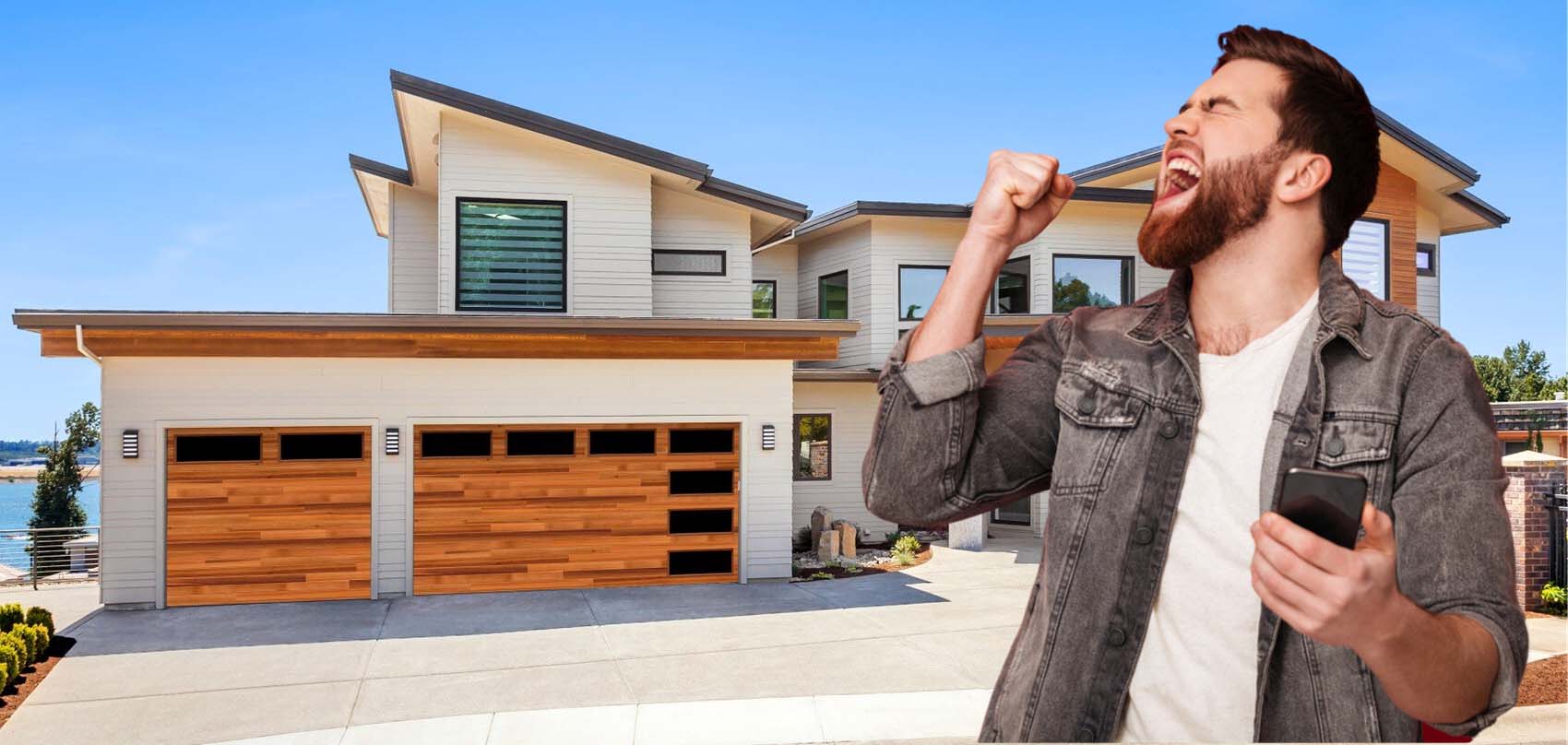
1. Roll-Up Garage Doors
Roll-Up doors, often seen in commercial settings, are made of slats that roll up into a coil. They are space-saving and durable but can be pricier and less decorative. For more on pricing, check out our garage door prices.
Roll-Up garage doors, often seen in bustling commercial areas, are a testament to modern engineering. Their design is a blend of functionality and space conservation. Each slat rolls seamlessly into a coil, eliminating the need for extensive tracks or overhead space. This makes them a favorite for businesses with limited space. However, their sleek design isn’t just for commercial appeal. Many contemporary homes have started adopting roll-up doors for their minimalist aesthetic, proving that practicality and style can indeed go hand in hand.
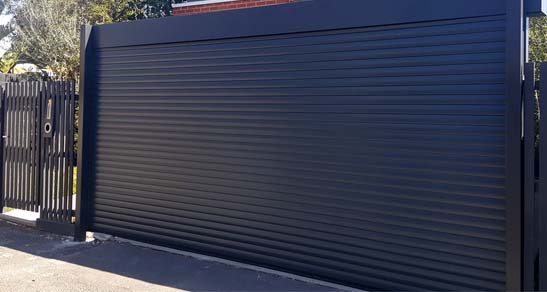
Pros Roll-Up Garage Doors:
- Space-saving design ideal for commercial settings.
- Durable construction, often made of sturdy materials.
- Minimal maintenance required.
Cons of Roll-Up Garage Doors:
- Can be more expensive than other types.
- Limited design and customization options.
- May not provide the best insulation.
2. Sectional Garage Doors
Comprising panel sections connected with hinges, these doors slide up and overhead as they rise. They are safe, durable, and widely available. However, they require space for tracks and can be more expensive.
Sectional garage doors are the unsung heroes of suburban neighbourhoods. Their design, made of several panels, allows them to bend around a track as they open. This means home-owners get the benefit of a door that opens vertically without swinging outwards, perfect for short driveways. But it’s not just about function. These doors come in a plethora of designs, materials, and finishes. From frosted glass sections for a modern touch to wood-finished ones that exude rustic charm, there’s a sectional door for every home’s character.
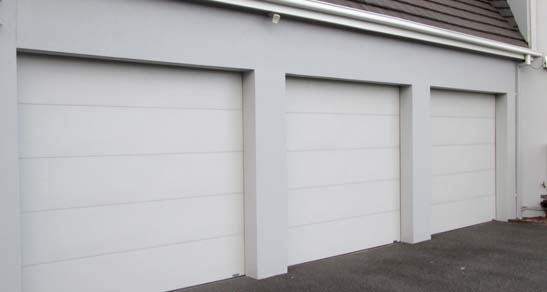
Pros of Sectional Garage Doors:
- Provides excellent security and insulation.
- Wide range of design and material options.
- Durable and long-lasting.
Cons of Sectional Garage Doors:
- Requires space for tracks and overhead storage.
- Can be more expensive due to multiple sections and mechanisms.
- Maintenance can be complex due to multiple moving parts.
3. Slide to the Side Garage Doors
These unique doors bend to one side of the garage, sitting parallel to the wall. They’re ideal for garages with little headroom. While they’re not as common, their vintage charm is undeniable.
Slide to the Side doors are a nostalgic nod to the garages of yesteryears. Operating without the need for balancing springs, these doors slide sideways, running along the garage wall. Their operation is reminiscent of sliding barn doors, making them a favorite for homeowners looking for a vintage touch. But don’t be fooled by their old-school operation. Many modern versions come with automated systems, blending traditional design with contemporary convenience.
A classic reborn. Side-Hinged garage doors are making a comeback, especially among homeowners looking to stand out. Swinging open like the grand doors of a mansion, they make every exit and entry a statement. They’re not just about theatrics, though. For those who use their garages as workshops or utility spaces, side-hinged doors offer the convenience of popping in and out without the need to open the entire space. Plus, with customization options galore, from ornate ironwork to sleek modern finishes, these doors are as versatile as they are stylish.
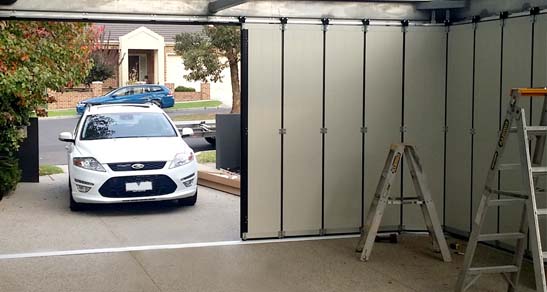
Pros of Slide to the Side Garage Doors:
- Ideal for garages with limited headroom.
- Simple mechanism with fewer parts.
- Vintage charm and appearance.
Cons of Slide to the Side Garage Doors:
- Not as common, making parts harder to find.
- May not provide the best insulation.
- Requires clear side space in the garage.
4. Side-Hinged Garage Doors
Resembling barn doors, these traditional doors swing open and closed from a hinged frame. They offer easy access but might not be as secure as other options.
A classic reborn. Side-Hinged garage doors are making a comeback, especially among homeowners looking to stand out. Swinging open like the grand doors of a mansion, they make every exit and entry a statement. They’re not just about theatrics, though. For those who use their garages as workshops or utility spaces, side-hinged doors offer the convenience of popping in and out without the need to open the entire space. Plus, with customization options galore, from ornate ironwork to sleek modern finishes, these doors are as versatile as they are stylish.
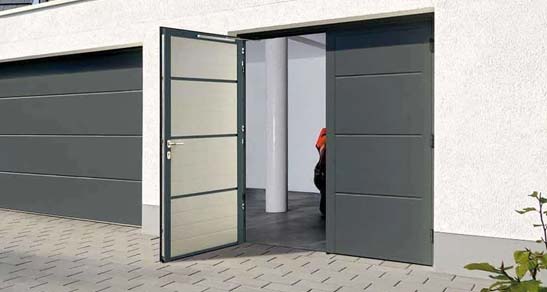
Pros of Side-Hinged Garage Doors:
- Traditional and classic appearance.
- Easy access without opening the entire door.
- Simple mechanism with fewer parts.
Cons of Side-Hinged Garage Doors:
- May not seal as well, leading to potential insulation issues.
- Not as secure as other types.
- Requires clear space in front of the garage for doors to swing open.
5. Tilt-Up Garage Doors
These doors, made from one solid piece, tilt out and up in a canopy style. They’re simple but require clear space in front when opening.
Tilt-Up doors, or canopy-style garage doors, are a marvel of design. Made from a single solid piece, they tilt out and then up, nestling themselves parallel to the garage ceiling. This unique operation means that a part of the door remains outside, forming a canopy. It’s this canopy feature that gives the door its name. Perfect for homes with spacious driveways, these doors are a blend of old-world charm and modern mechanics, offering homeowners a unique way to showcase their style.
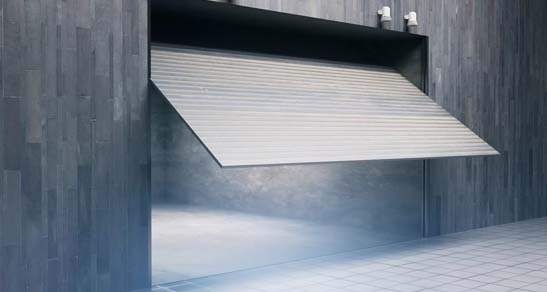
Pros of Tilt-Up Garage Doors:
- Simple and straightforward mechanism.
- Can be customized to match home aesthetics.
- Requires fewer parts, reducing potential maintenance.
Cons of Tilt-Up Garage Doors:
- Swings outward, requiring clear space in front.
- May not provide the best insulation.
- Not as common as sectional or roll-up doors.
6. Swing Out Garage Doors
Mimicking carriage house doors, these doors swing out from the center. They’re elegant but need space in front of the garage.
Swing Out garage doors, with their elegant operation, are reminiscent of the grand carriages of the past. Designed to swing gracefully outwards, they’re a visual treat, turning heads every time they’re in action. But their beauty isn’t just skin deep. These doors are perfect for homes that want to maximize their ceiling space, as there’s no overhead track system. Whether you opt for a design that mimics the stately carriage doors of old or a sleek, contemporary version, Swing Out doors are a statement of style and sophistication.
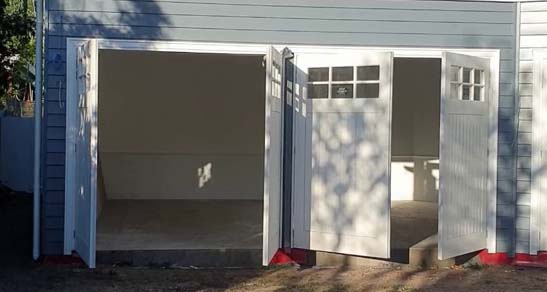
Pros of Swing Out Garage Doors:
- Elegant and classic appearance.
- Can mimic traditional carriage house doors.
- Provides a unique look to the home.
Cons of Swing Out Garage Doors:
- Requires space in front of the garage to swing out.
- May not seal as well, leading to potential insulation issues.
- Not as secure as other types.
7. Roller Doors
Constructed from corrugated steel or other materials, these doors roll up around a drum. They’re compact, making them perfect for short driveways. Dive deeper into roller doors with our ultimate guide and learn about their benefits.
Compact, efficient, and modern – Roller doors are the epitome of urban design. Made of corrugated steel or other materials, these doors roll up around a drum, ensuring that ceiling space remains free. This design is a boon for garages with limited headroom. But their benefits aren’t just functional. Roller doors offer a sleek appearance, making them a favorite for contemporary homes. Plus, with advancements in technology, many now come with quiet motors and smart controls, adding convenience to their list of advantages.
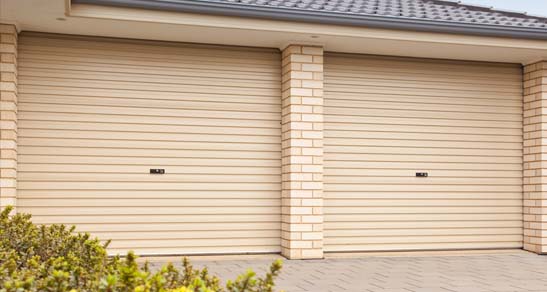
Pros of Roller Doors:
- Compact design ideal for garages with limited space.
- Simple mechanism with fewer parts.
- Often comes with automated opening systems.
Cons of Roller Doors:
- Typically not insulated, which can affect temperature control.
- Metal construction can dent if hit with force.
- Limited design and customization options.
8. Aluminum Garage Doors
Lightweight and rust-proof, aluminum doors are perfect for contemporary designs. However, they can dent easily. For more on aluminum doors, visit our aluminum doors page.
Aluminum garage doors are the modern homeowner’s dream. Lightweight yet sturdy, they offer a sleek look without compromising on durability. Their rust-resistant nature makes them perfect for humid climates, ensuring longevity. But it’s not just about resilience. Aluminum doors, often paired with large glass sections, allow ample natural light, turning gloomy garages into bright spaces. Whether it’s the shimmer of brushed aluminum under porch lights or the chic matte finish of a powder-coated variant, these doors are a testament to modern design.
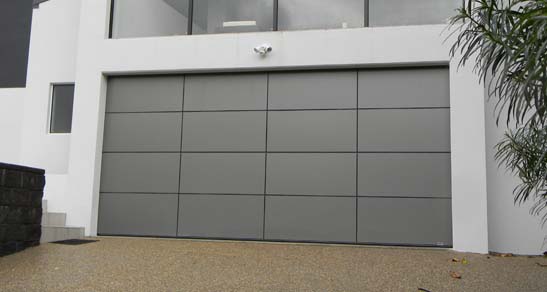
Pros of Roller Doors:
- Lightweight, making it easier on mechanisms and openers.
- Rust-resistant and ideal for humid climates.
- Modern and sleek appearance.
Cons of Aluminum Garage Doors:
- Can dent easily.
- May not provide the best insulation.
- Can be noisier than other types.
9. Fiberglass Garage Doors
These composite doors combine a steel core behind a fiberglass skin. They’re resistant to salt-water corrosion but can break upon impact.
Fiberglass garage doors are where innovation meets aesthetics. Their unique construction, a steel core behind a fiberglass skin, offers a blend of strength and style. Resistant to the corrosive effects of salt water, they’re a favorite in coastal areas. But their appeal isn’t limited to their durability. Fiberglass doors can mimic other materials, from the rich grain of wood to the sleek finish of steel, offering homeowners a plethora of design choices without the associated maintenance.
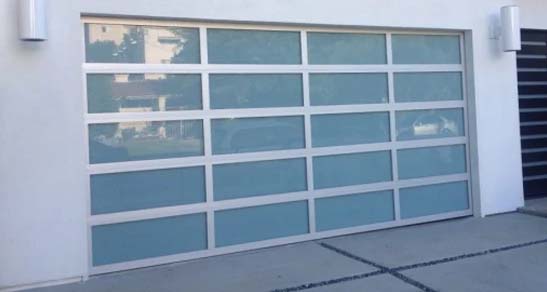
Pros of Fiberglass Garage Doors:
- Resistant to corrosion, making it ideal for coastal areas.
- Can mimic other materials like wood.
- Lightweight and easy to operate.
Cons of Fiberglass Garage Doors:
- Can break or crack upon impact.
- Provides poor insulation compared to other materials.
- Color may fade over time with exposure to sunlight.
10. Steel Garage Doors
Made of galvanized steel, these doors can mimic wood grain. They’re durable but can rust if scratched.
The robustness of steel garage doors is legendary. Offering unparalleled security, they’re the first choice for many homeowners. But steel doors aren’t just about strength. Modern manufacturing techniques mean they can mimic the warm grains of wood or the sleek sheen of modern designs. Insulated variants offer excellent temperature control, making them energy efficient. From the quiet suburbs to bustling city homes, steel garage doors are a blend of resilience, design, and functionality.
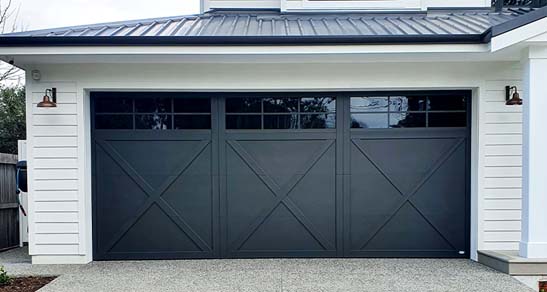
Pros of Steel Garage Doors:
- Highly durable and long-lasting.
- Can be insulated for better temperature control.
- Wide range of design options.
Cons of Steel Garage Doors:
- Can rust if the surface is scratched or damaged.
- Heavier than other materials, requiring a robust mechanism.
- Can dent if hit with force.
11. Wood Garage Doors
Offering a classic appearance, wooden doors are customizable but require regular maintenance.
Wooden garage doors are timeless. Their natural grain offers a warmth and elegance that few other materials can match. Perfect for homes that lean towards classic designs, these doors are customizable down to the last detail. From rich mahoganies to light pines, the choices are endless. But their appeal isn’t just aesthetic. Wood offers natural insulation, making these doors energy efficient. With the right care, wooden garage doors age gracefully, their patina telling tales of years gone by.
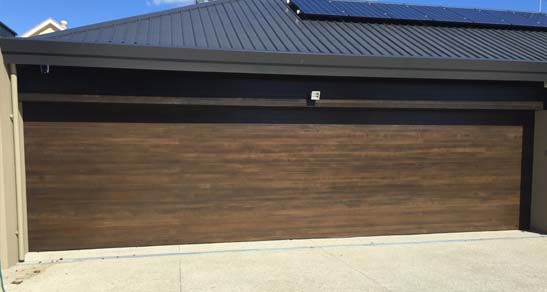
Pros of Wood Garage Doors:
- Natural and classic appearance.
- Can be customized with various designs and finishes.
- Provides good insulation.
Cons of Wood Garage Doors:
- Requires regular maintenance to prevent rot and wear.
- Can be expensive depending on the type of wood.
- Susceptible to termites and pests.
12. Vinyl Garage Doors
Durable and low-maintenance, vinyl doors are resistant to dents but have limited color choices.
Vinyl garage doors are the unsung workhorses of the garage door world. Known for their durability, they resist dents, making them perfect for homes with active kids or bustling driveways. Their maintenance is a breeze, often requiring just a simple wash to keep them looking new. Available in a range of colors and designs, vinyl doors offer homeowners a balance of style, resilience, and convenience. Plus, their lightweight nature means they’re easy on the mechanisms, ensuring longevity.
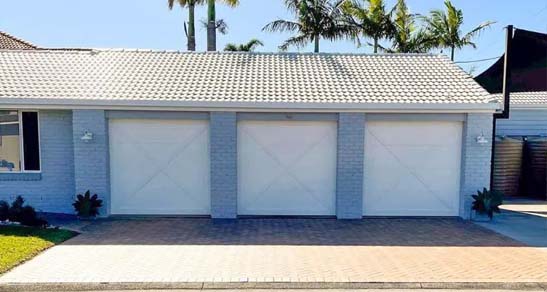
Pros of Vinyl Garage Doors:
- Durable and resistant to dents.
- Minimal maintenance required.
- Available in a range of colors and designs.
Cons of Vinyl Garage Doors:
- Limited customization and design options.
- Can warp in extreme temperatures.
- Difficult to paint or change color.
13. Glass Garage Doors
Sleek and modern, these doors let in natural light but offer less privacy.
Glass garage doors are where architecture meets art. Offering a sleek, modern look, they turn ordinary garages into design statements. Large glass sections, framed by sturdy materials like aluminum, allow ample natural light, transforming dark garages into bright spaces. They’re perfect for homes with a view, allowing unobstructed vistas even when the door is down. While they offer less privacy, the sheer aesthetic appeal of glass doors makes them a favorite among modern design enthusiasts.
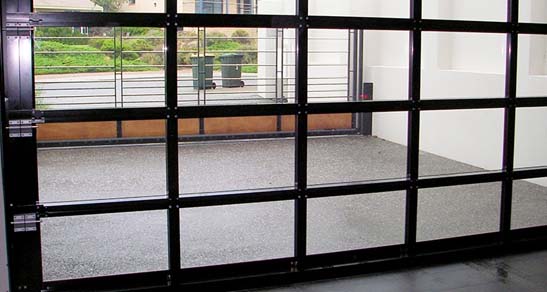
Pros of Glass Garage Doors:
- Modern and sleek design.
- Allows natural light into the garage.
- Can be paired with aluminum frames for a contemporary look.
Cons of Glass Garage Doors:
- Provides less privacy.
- Can be less energy-efficient.
- Glass can break if hit with force.
14. Insulated Garage Doors
Designed for energy efficiency, these doors come with layers of insulation. They’re pricier but can reduce energy bills.
Insulated garage doors are the answer to the modern homeowner’s energy concerns. Designed to keep the cold out in winters and the heat at bay in summers, they’re energy efficient. Layers of insulation ensure that temperature transfer is minimal, potentially reducing heating and cooling costs. But their benefits aren’t just functional. Modern insulated doors come in a range of designs and finishes, ensuring that homeowners don’t have to compromise on style for efficiency.
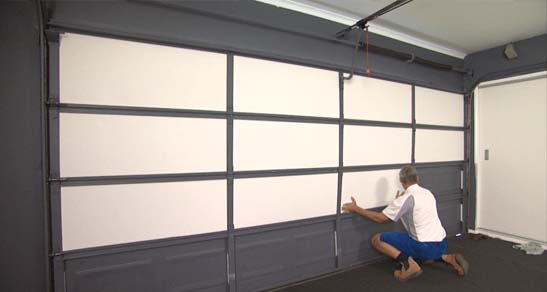
Pros of Insulated Garage Doors:
- Provides excellent temperature control.
- Can reduce noise from the outside.
- Energy-efficient, potentially reducing heating and cooling costs.
Cons of Insulated Garage Doors:
- More expensive than non-insulated doors.
- Heavier, requiring a robust opening mechanism.
- Insulation can degrade over time, requiring replacement.
15. Custom Garage Doors
For those seeking a unique touch, custom doors can be tailored to specific needs and designs.
Custom garage doors are for those who tread the path less taken. Tailored to the homeowner’s exact specifications, they’re unique in every sense. Whether it’s a specific material, a unique design, or a combination that’s never been tried before, custom doors are a testament to individuality. They offer homeowners a chance to showcase their style, making their home stand out. With custom doors, the only limit is imagination.
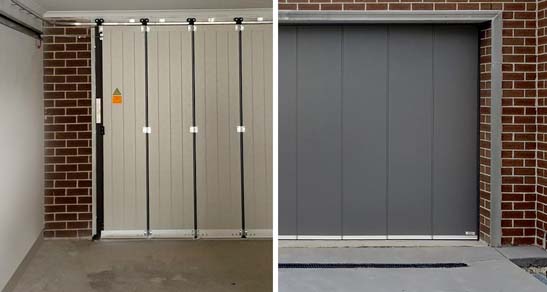
Pros of Custom Garage Doors:
- Tailored to the homeowner’s specific needs and preferences.
- Unique design sets the home apart.
- Can be made from a combination of materials.
Cons of Custom Garage Doors:
- Typically more expensive due to customization.
- Longer lead times for manufacturing and installation.
- Potential challenges in finding replacement parts.
Conclusion
Choosing the right garage door is more than just a functional decision; it’s an extension of your home’s personality and a reflection of your style. In today’s diverse market, the plethora of options available ensures that there’s a perfect fit for every home and every aesthetic. From the minimalist charm of roll-up doors to the classic elegance of wooden ones, the choices are as varied as they are numerous.
However, it’s essential to consider not just the visual appeal but also the practical aspects. Ensure you get the best in terms of practicality and design. Get a Quote Today!. Factors like insulation, maintenance, durability, and security play a crucial role in the decision-making process. For instance, while glass doors might offer a sleek, modern look, they might not provide the privacy some homeowners seek. On the other hand, steel doors, known for their robustness, might come with the added task of rust prevention.
Furthermore, with the world moving towards sustainable solutions,Discover our range of energy-efficient doors. See More, energy efficiency has become a significant consideration. Insulated doors, for instance, can play a pivotal role in reducing energy consumption, making them an excellent choice for those looking to minimize their carbon footprint.
Lastly, always remember that your garage door is a long-term investment. It’s not just about aesthetics or immediate needs but also about durability and how it will stand the test of time. With advancements in technology, many modern doors come equipped with features like smart controls, enhancing convenience and security.
At Empire Doors, we understand the nuances of choosing the perfect garage door. Our extensive range, from affordable roller shutter doors to elegant aluminum doors, ensures that every homeowner finds their perfect match. Dive deeper into the world of garage doors with our insightful blogs or explore our product range to find a door that resonates with your home’s character.
Remember, a garage door is not just an entry or exit point; it’s a statement of style, a testament to security, and a reflection of the care you invest in your home.
Make a statement with Empire Doors. Contact Us for a personalized consultation.
